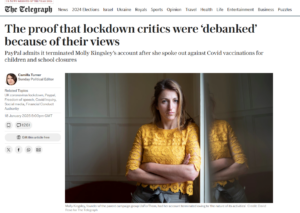The Troubling Case of Censorship and Debanking: A Critical Look at PayPal’s Practices
At Extreme Investor Network, we strive to bring you insights that not only inform but also empower you to navigate the complex world of finance and economics. Recently, a case involving PayPal has raised serious concerns about censorship, debanking, and the broader implications for free speech and business practices.
PayPal’s Controversial Admission
In a shocking revelation, PayPal has acknowledged that it has "debanked" users based on their views regarding COVID-19. This admission is deeply troubling for investors and entrepreneurs alike, as it raises fundamental questions about the power of tech companies over financial transactions and individual expression.
For instance, Molly Kingsley, founder of the campaign group UsForThem, found herself abruptly cut off from her PayPal account. The reason? PayPal claimed her account was terminated due to “content published by UsForThem relating to mandatory Covid-19 vaccinations and school closures.” This raises an important issue: what happens when financial service providers prioritize political agendas over neutrality? When entities like PayPal decide what content is acceptable, who decides the boundary between opinion and actionable harm?
Legal Battles and Financial Security
Our founder faced similar challenges, having to enlist legal assistance to recover funds from PayPal. This experience speaks volumes about the precarious position many businesses find themselves in when entangled in disputes over ideologies. In today’s world, the reality is that accepting payment through platforms like PayPal could expose you to restrictions that appear arbitrary and politically motivated. This is not merely a question of customer service—it’s about the fundamental rights of businesses to operate free from censorship.
A Pattern of Censorship
It’s not just individuals who are getting debanked; many have experienced suppression simply by discussing or mentioning sensitive topics like vaccines. The trend seems to indicate a systemic effort to silence discourse around contentious issues. Our research suggests that the coordinated censorship could be benefiting certain corporations, such as those in the pharmaceutical industry. The question of whether or not there’s a deliberate strategy to suppress dissenting voices is more urgent than ever.
Moreover, the implications for investors are profound. The more consolidated financial power becomes, the more sectors of the economy could find themselves at the mercy of a few powerful firms who dictate what is permissible. As part of your investment strategy, it’s crucial to consider the integrity and transparency of the platforms you utilize for financial transactions.
The Future of Financial Transactions
At Extreme Investor Network, we urge our readers to be proactive in understanding these dynamics. The situation begs the question: where do you draw the line between corporate policy and ethical responsibility? Are you comfortable relying on platforms that can censor you or debank you based on your beliefs?
As a responsible investor or business owner, you should diversify the platforms you use for transactions. Seek alternatives that uphold principles of free speech and protect your financial interests, regardless of your viewpoints.
Conclusion
In an age where financial mobility is increasingly governed by tech giants with their own agendas, staying informed and vigilant is crucial. The future of your investments may depend not only on market fluctuations but also on the broader socio-political landscape and the companies navigating it.
We at Extreme Investor Network are here to keep you informed and prepared. Together, we can advocate for transparency and fairness in our economic dealings. Stay tuned for more insights and analysis to help guide your strategic decisions in uncertain times.

